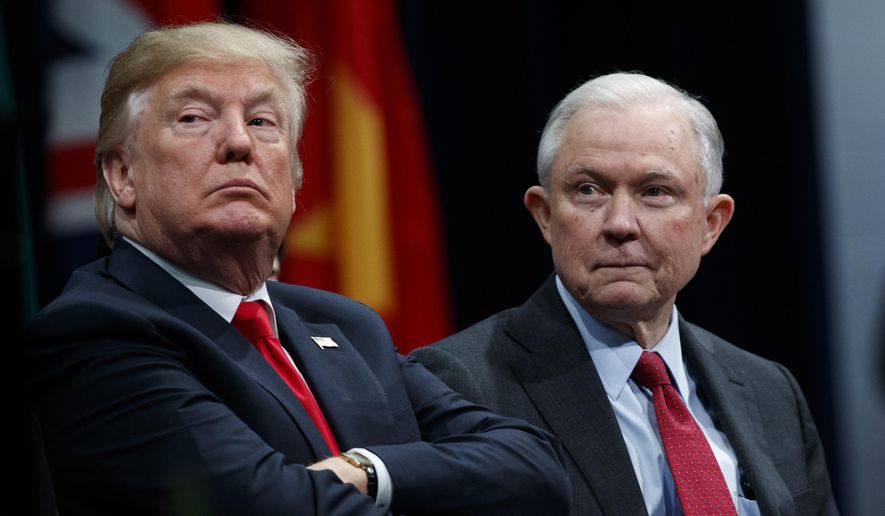Embattled Attorney General Jeff Sessions resigned Wednesday, making good on President Trump’s promise that he would be out of office after the midterm elections.
Mr. Sessions said he was resigning at Mr. Trump’s request. He did not provide a reason in his resignation letter, but praised the president for their work together.
“I have been honored to serve as Attorney General and have worked to implement the law enforcement agenda based on the rule of law that formed a central part of your campaign for the Presidency,” he said in a letter to President Trump.
His departure sent shock waves through Washington, with the Justice Department still overseeing the ongoing probe by special counsel Robert Mueller into the 2016 election, Russian meddling and Trump campaign activities.
Mr. Sessions had recused himself from that matter, causing much of the break with Mr. Trump.
The president said on Twitter that he will nominate a permanent replacement “at a later date.”
“We thank Attorney General Jeff Sessions for his service, and wish him well!” Mr. Trump tweeted.
The president said Matthew G. Whitaker, chief of staff to Mr. Sessions at the Justice Department, “will become our new acting attorney general of the United States. He will serve our country well.”
Under normal rules Deputy Attorney General Rod Rosenstein, who has been overseeing the Russia probe, would become acting attorney general. But he and Mr. Trump have clashed, particularly after it was revealed Mr. Rosenstein talked about secretly recording the president or having him declared incapacitated.
Mr. Trump flexed the Vacancies Reform Act to skip over Mr. Rosenstein and other department officials who had been through Senate confirmation, and settle on Mr. Whitaker.
That move could draw legal scrutiny.
The president, in an interview with The Washington Times last week, denied reported he’d talked to Mr. Whitaker about replacing Mr. Sessions as the permanent attorney general. But the president called him “very good person and a talented person.”
Senate Minority Leader Charles E. Schumer was holding a press conference when he was told of Mr. Sessions’ departure. He seemed stunned by the development.
“Protecting Mueller and his investigation is paramount,” Mr. Schumer said, warning of “a constitutional crisis” should the Justice Department curtail the probe.
Mr. Trump, during a press conference earlier Wednesday, had said he expected some Cabinet moves, but did not telegraph the Sessions decision.
The departure was not unexpected, though.
Though Mr. Sessions was the first senator to endorse the president in 2016, things began to sour once Mr. Sessions was ensconced at the department, and recused himself from Russia investigation matters.
That led to a series of personal attacks by the president who repeatedly called Mr. Sessions names ranging from “an idiot” to “disgraceful.” Earlier this year, Mr. Trump said had had “no attorney general.”
He also complained that the Justice Department’s criminal prosecution of two GOP House members could hurt Republicans’ chance to maintain the majority. Both of those Republicans appear to have won their races, though the GOP did lose the majority in Tuesday’s elections.
Mr. Sessions had previously submitted his resignation last year shortly after the special counsel was appointed, but Mr. Trump refused to accept it.
This week Mr. Sessions submitted his resignation in a letter addressed to Mr. Trump, but delivered to White House Chief of Staff John F. Kelly.
Mr. Sessions defended his tenure.
“We have restored and upheld the rule of law — a glorious tradition that each of us has a responsibility to safeguard,” Mr. Sessions wrote. “We have operated with integrity and have lawfully and aggressively advanced the policy agenda of this administration.
Some conservative leaders had been pushing Mr. Trump to give Mr. Sessions more time, hoping he would last at least into the new year. They said Mr. Sessions had played a crucial role in advancing the president’s agenda.
During his tenure Mr. Sessions reversed Obama-era prosecution directives that included lighter sentences for some drug offenders, led the push to crack down on sanctuary cities and runaway asylum claims, and spearheaded an effort to combat opioid addiction.
“He’s restored the department to its basic role of as a machine of criminal justice as well as being a champion of liberty,” said Reagan administration Attorney General Edwin Meese III. “He has made sure the department returned to the path of constitutional fidelity, changing the position of the government on a number of constitutional issues that he went on to win in the Supreme Court.”
• Jeff Mordock can be reached at jmordock@washingtontimes.com.




Please read our comment policy before commenting.